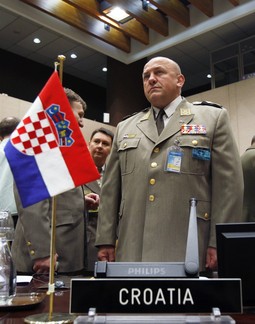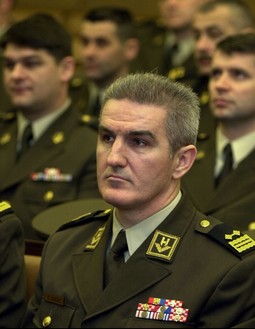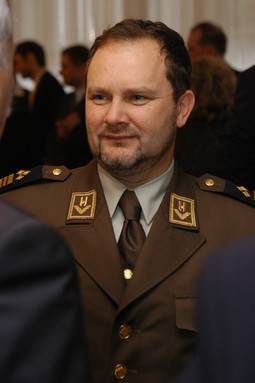Published in Nacional number 722, 2009-09-15
CATASTROPHIC state of affairs in the Armed Forces
Mesic to sack General Lucic
JOSIP LUCIC, the Croatian Armed Forces Chief of General Staff, should be dismissed from the post by the end of October as a result of the numerous scandals that have been shaking the Croatian Army for some time now
 SAVED BY NATO ACCESSION Josip Lucic was expected to step down from his duties last year, when his five-year term wound up, but was held over at the post as Croatia joined NATO at the time
Croatian Armed Forces Chief of General Staff, General Josip Lucic, will be dismissed from his post by the end of October, Nacional has learned from sources close to Croatian Government. Croatian President and Armed Forces Supreme Commander Stjepan Mesic will meet with Prime Minister Jadranka Kosor to discuss the matter this month, just ahead of his trip to Cuba and New York for a session of the UN General Assembly. After that Defence Minister Branko Vukelic will formally propose the dismissal, which will be signed by Jadranka Kosor and Stjepan Mesic.
SAVED BY NATO ACCESSION Josip Lucic was expected to step down from his duties last year, when his five-year term wound up, but was held over at the post as Croatia joined NATO at the time
Croatian Armed Forces Chief of General Staff, General Josip Lucic, will be dismissed from his post by the end of October, Nacional has learned from sources close to Croatian Government. Croatian President and Armed Forces Supreme Commander Stjepan Mesic will meet with Prime Minister Jadranka Kosor to discuss the matter this month, just ahead of his trip to Cuba and New York for a session of the UN General Assembly. After that Defence Minister Branko Vukelic will formally propose the dismissal, which will be signed by Jadranka Kosor and Stjepan Mesic.
And while top national officials have for some time now been considering the departure of General Josip Lucic from his duties as Chief of General Staff, it has now become a certainty.
President Stjepan Mesic was not present at the biggest NATO commando military exercises this year, held in Udbina this Tuesday under the auspices of US European Command. The military exercise at which Josip Lucic and Defence Minister Branko Vukelic were present was organised on the Croatian side by Colonel Nikola Zupanic, Commander of the Special Operations Battalion, but the President was in Split two days earlier for a friendly football match between the Croatian and British Armed Forces teams. It was a clear message to Lucic and Zupanic of what he thought about the recent scandal surrounding Kovcanje Bay.
And, Nacional has learned that President Stjepan Mesic's envoy for Croatian Navy Day will in fact be Lucic's deputy, Lieutenant General Slavko Baric. It all points to Lucic's inevitable departure. There are a number of reasons for the move, and the latest scandal surrounding the construction of a block of apartments at the Croatian Army base at Kovcanja Bay without the necessary permits, the arbitrary violation of deadlines for construction previously planned for 2011, and the demolition of a part of the waterfront in the same bay certainly did not work in Lucic's favour. There was no reaction whatsoever from Lucic to the fact that Defence Ministry contractors, specifically Branko Madarevic, the director of the Informaticki mediji Company, who has signed contracts worth millions of kuna with the Defence Ministry, were provided free accommodation at Kovcanje during the summer holidays and near Delnice in the winter, organised by the Commander of the Special Operations Battalion, Colonel Nikola Zupanic, and flights over Zagreb aboard the Presidential helicopter H-254, for which the objective responsibility falls on Croatian Air Force Commander, Major General Vlado Bagaric.
The only real question is how many of these cases there were of which we do not know? President Stjepan Mesic and Defence Minister Branko Vukelic have requested General Lucic make an official disclosure on the entire matter. Lucic is criticised for not having ordered an investigation the moment he found out about it all and for not having suspended Zupanic and Bagaric until such an investigation had been completed. Instead, Lucic completely ignored all of the facts and spent his time considering whether or not to file charges against Nacional for making aerial photos of Kovcanje. Nacional's source has confirmed that Lucic wanted at all costs to stay on at the helm of the Armed Forces.
He allegedly proposed that Major General Jozo Milicevic, who is attending a military academy in the United States, be promoted to Lieutenant General so that he could appoint him deputy upon his return from the USA. Lucic counted on his deputy to date, Lieutenant General Slavko Baric, who recently received his doctorate, leaving the Armed Forces by the end of 2009 if he succeeded in staying at the head of the army until Stjepan Mesic left office.
That was why Jozo Milicevic was the logical solution, because Lucic does not need people who think with their own heads, but rather yes-men and sycophants who will be loyal to him because he helped them out. Lucic is on very good terms with the already mentioned Colonel Nikola Zupanic, who cannot be promoted to the rank of general at his current command post in the Special Operations Battalion.
In order to facilitate this, there is no end of discussion at the military HQ on having Zupanic take over the command of the Motorised Guard's Brigade based in Knin, as the command structure requires its commander to be a general. Armed Forces HQ lacks a sufficient number of trained and quality personnel, and those that have any talent try to get into the military diplomacy. Besides a handful of top military officers with civilian university degrees, along with military degrees, which is insufficient for NATO standards, where all generals have doctorates, all high-ranking Croatian officers are at the level of the Command & Staff College and War College completed in Croatia. If they have a civilian degree, it was one they received back in the 1990s. DARKO GRDIC is currently the Director of the Military Security & Intelligence Agency
DARKO GRDIC is currently the Director of the Military Security & Intelligence Agency
Chief of General Staff Josip Lucic, unfortunately, has no military college education, and what he does have, basic Officers School, was awarded to him without attendance by former Defence Minister Zeljka Antunovic. As far as a civilian education goes, Lucic has a degree in kinesiology. These kinds of officers are very inflexible in their thinking, limited to a very narrow area of activity and lack breadth and vision, are not inclined towards civilian education and a long professional career, and therefore, besides their regular duties and because of a lack of a good system to manage their careers, are concerned only with how and whom to curry favour with for their personal promotion and professional advancement.
In this kind of system they have an uncritical approach to everything the top military brass discusses as obedient yes-men opening paving the way for their own personal advancement. There is no room for this way of running the Armed Forces in NATO. There is no doubt that the Croatian Army lacks a breath of fresh air in its administration, at the highest levels. Over the past year the Croatian Army has looked more and more like a parade and event organiser that uses protocol activities to cover up deficiencies in its management, personnel and expertise; all the more evident since the accession to NATO.
There is a chain of command in the Army, but no chain of responsibility. Serious omissions like the catastrophic preparations for the fire-fighting season and the negligent maintenance of aircraft are tolerated. Acquisitions and the modernisation of the Armed Forces are more the result of circumstance than systematic planning in the military organisation. Officers that have no future are sent to the most prestigious US schools. Key strategic documents that will redefine the future goals of the Armed Forces, and which should have been completed this year still do not exist. The Strategic Defence Overview, the Long Term Armed Forces Development Plan and the Defence Strategy will not be completed this year, and were supposed to have been.
At a time when large-scale modernisation and acquisition projects are being launched in the Armed Forces one would expect that there would be numerous teams leading these projects. Four engineers, however, are simultaneously leading four projects, which has led to delays, nervousness and a situation that is ever closer to their departure from the ranks of the Armed Forces. There had been word that high-ranking retired officers would be engaged in these assignments, but that has not materialised. Training is targeted only to those leaving for peace-keeping missions, the oft-touted active reserves do not exist, and those that could bear arms at the end of 1995 and now a full fifteen years older, and launching any kind of exercises with them would be a mission impossible.
Volunteer conscripts have lost the right to additional healthcare insurance and the scope of the training program has been reduced. Croatian Army officers who have completed civilian degrees through the Defence Ministry's cadet program wind up cooking coffee in the offices of unit commanders. There is almost no interest among youth to become military pilots, and there were so few candidates this year that none of them even passed the medical exam. Raising the standard of troops, which has been talked about for years, is nothing more than a pipe dream. How else would one explain the fact that the Armed Forces do not have a single modern kitchen block in use with all of the necessary permits.
And when it comes to addressing the housing needs of soldiers, that too is castle in the air, een though there are attempts to "sell" the story of big plans for the future, which have been dragging on for a decade now. There are several other reasons why General Lucic will be stepping down this year. It was expected that he would be relieved of the command post in 2008, when his five-year term expired. It is customary in all armies around the world for the Chief of General Staff to step down after their terms are up, be they of three, four or five years. Which was why the decision last year by the national leadership to appoint Lucic to a second term came as a surprise. Nevertheless, President Stjepan Mesic and Prime Minister Ivo Sanader have agreed that it would have been inappropriate to relieve Lucic just ahead of Croatia's accession to full membership in NATO given that Lucic and his associates had in the five years of his term been successful in implementing at least the minimum of the requirements for NATO accession, and to train a few hundred soldiers to be credible partners to allied forces in the field.
 LIEUTENANT GENERAL Slavko Baric recently returned from several months at a US military collegeThat is why the national leadership, in gratitude for the job he had done, allowed General Lucic to stay on at the helm of the Army he has now taken through the doors of NATO. There had been word that Lucic would step down when President Mesic left office next year. That, however, would not suit Mesic, as he would then have no influence on the choice of Lucic's successor. One should not forget that Mesic will continue to be active in politics after leaving the president's office, and he will certainly have a favourite in the presidential race. If "his" candidate wins the elections he would leave him in his legacy a person at the helm of the Army with whom the new president could successfully cooperate.
LIEUTENANT GENERAL Slavko Baric recently returned from several months at a US military collegeThat is why the national leadership, in gratitude for the job he had done, allowed General Lucic to stay on at the helm of the Army he has now taken through the doors of NATO. There had been word that Lucic would step down when President Mesic left office next year. That, however, would not suit Mesic, as he would then have no influence on the choice of Lucic's successor. One should not forget that Mesic will continue to be active in politics after leaving the president's office, and he will certainly have a favourite in the presidential race. If "his" candidate wins the elections he would leave him in his legacy a person at the helm of the Army with whom the new president could successfully cooperate.
And given that the Chief of General Staff is also the President's chief military advisor, Mesic certainly wants to influence the selection. The departure of Josip Lucic begs the question of his successor. The only serious candidates to replace him as the head of the Armed Forces are Lucic's current deputy, Lieutenant General Slavko Baric, and the director of the Military Security & Intelligence Agency, Lieutenant General Darko Grdic.
Related articles
Why the State Attorney's Office did not draft the Ina contract
Former Croatian President Stjepan Mesic was one of the first in Croatia to call for the public release of the Veteran's Register. Nacional's reporter… Više
Latest news
-
28.10.2010. / 14:15
'A profitable INA is in everyone's interest'
-
28.10.2010. / 09:38
Sanader’s eight fear SDP — Won’t bring down Government
-
21.10.2010. / 15:02
Interior Ministry turned a blind eye on Pukanic assassination
-
20.10.2010. / 09:34
Barisic could bankrupt HDZ




